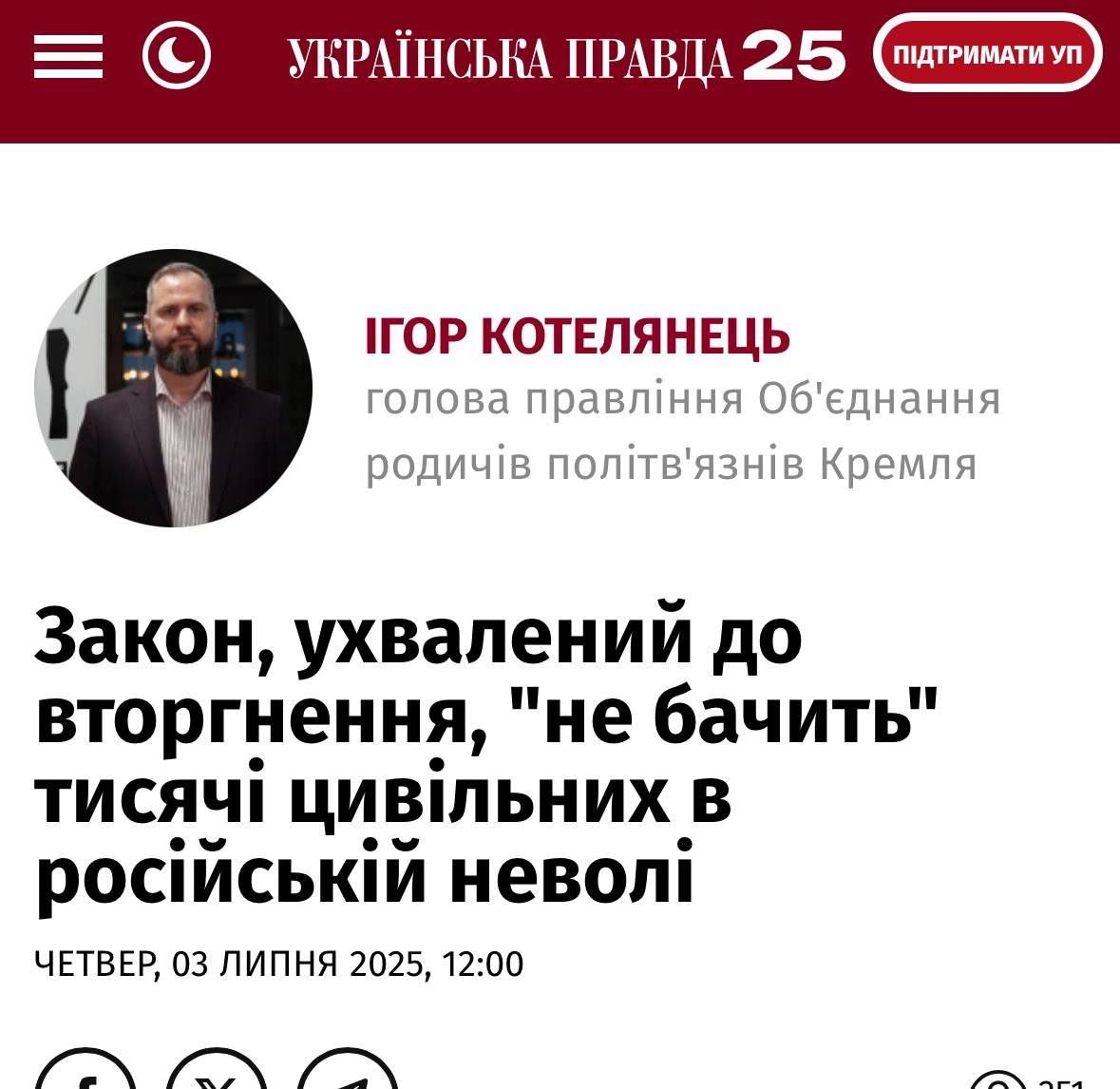

A Law That "Doesn't See" Thousands of Civilians in Russian Captivity: Why It Must Be Changed
The head of our organization, Ihor Koteliants, has published an op-ed in Ukrainska Pravda addressing a critical gap in Ukrainian legislation: the law intended to protect those unlawfully imprisoned as a result of Russia’s aggression currently ignores the majority of civilians held by Russian forces in temporarily occupied territories — without sentence, without rights, without hope.
The victims are not only activists or military personnel — they include teachers, farmers, civil servants, and social workers. Many have endured torture, deportation, and abuse, yet the state does not recognize them.
Under current law, only “political prisoners” and “hostages” are acknowledged. This is discrimination. Thousands of other victims are left without status, compensation, or even moral support.
The Commission under the Ministry for Reintegration makes decisions without clear criteria, deepening mistrust and inconsistency.
We are calling for change. The legislation must be updated to reflect the realities of full-scale war and to recognize all cases of unlawful deprivation of liberty as war crimes — ensuring support and justice for every victim.
📖 Read the full op-ed (in Ukrainian) on the Ukrainska Pravda website:
https://www.pravda.com.ua/columns/2025/07/3/7519980/
A Law Passed Before the Invasion “Does Not See” Thousands of Civilians in Russian Captivity
Russia’s war against Ukraine has led to numerous cases of the illegal imprisonment of civilians. Today, tens of thousands of Ukrainian citizens are being held by Russian forces in the temporarily occupied territories (TOT), cut off from the outside world, without charges or trial. Their families have no access to information about their whereabouts or health. These people are effectively erased from Ukraine’s legal framework.
Even before the full-scale invasion, there was already a pattern of unlawful detention of political prisoners — Crimean Tatars, activists, and civilians in the so-called “L/DNR.” In January 2022, the Verkhovna Rada adopted the Law of Ukraine “On Social and Legal Protection of Persons for Whom the Fact of Deprivation of Liberty Due to Armed Aggression Against Ukraine Has Been Established, and Their Family Members.” The law was meant to become a cornerstone of support for such people. But just a month later, on February 24, Russia launched a new wave of aggression, drastically changing the scale and logic of war crimes against civilians.
All kinds of people became targets: farmers, teachers, scientists, clergy, civil servants. They were not activists, but were persecuted for refusing to cooperate, for holding Ukrainian passports, for simply refusing to bow their heads. These actions qualify as war crimes under Article 147 of the Geneva Convention: willful killing, torture, inhumane treatment, and unlawful confinement of persons protected under international law. Article 86 of the Rome Statute highlights the responsibility for the systematic commission of such crimes as part of state policy.
The current law recognizes only two categories of victims: political prisoners and hostages. These limitations are discriminatory. They fail to cover the majority of victims of Russian terror. For instance, Tetyana Klyuchko, a 47-year-old social worker from Enerhodar, was abducted from her home and later sentenced by a Russian court to 12 years in prison on fabricated charges. She had no political involvement. No demands were made for her release. She was simply living under occupation. As a result, she does not fall under either of the two legal categories.
Her story is not an exception. In practice, such people — employees of strategic enterprises who refused to betray their country, teachers who declined to change curricula, farmers who resisted surrendering crops to the occupiers — are left without state support. They were unlawfully detained, tortured, deported, and forced to issue public “apologies.” After their release, they receive no compensation, no official status, not even symbolic recognition.
Moreover, the decision-making process of the Commission under the Ministry for Reintegration lacks transparency. Some individuals are granted victim status under the law; others are denied without explanation. This creates an impression of injustice. People who endured the same horrors are treated unequally.
According to international humanitarian law, the legality of detention must be assessed based on three criteria:
(1) the person’s status as a protected civilian;
(2) the purpose of the detention (which must be legitimate);
(3) adherence to legal safeguards.
In most cases in the occupied territories, all three criteria are violated. These individuals are, therefore, illegally detained.And the state must recognize this.
The absence of provisions in the law to support all victims of unlawful detention is not just a gap — it is a form of state discrimination. The issue is not semantics; it has real-world consequences: tens of thousands of victims are left outside the protection framework.
We can no longer remain confined to a framework that separates citizens based on the “right” kind of captivity. The state must not recognize some victims while ignoring others. The law must be fundamentally changed. It must cover all civilians who became victims of unlawful detention as a result of Russia’s aggression — regardless of the motive for their arrest, their location, or whether political slogans were involved. If a person was tortured, imprisoned, or deported, they deserve recognition, support, and compensation.
Without these changes, we are not only losing public trust — we are undermining the ability to document war crimes, assess damages, and seek reparations in the future. We are depriving people not only of assistance, but of their right to the truth.
The war changed everything. And now, it is time to change the law.
Igor Koteliianets,
Head of the Association of Relatives of Political Prisoners of the Kremlin